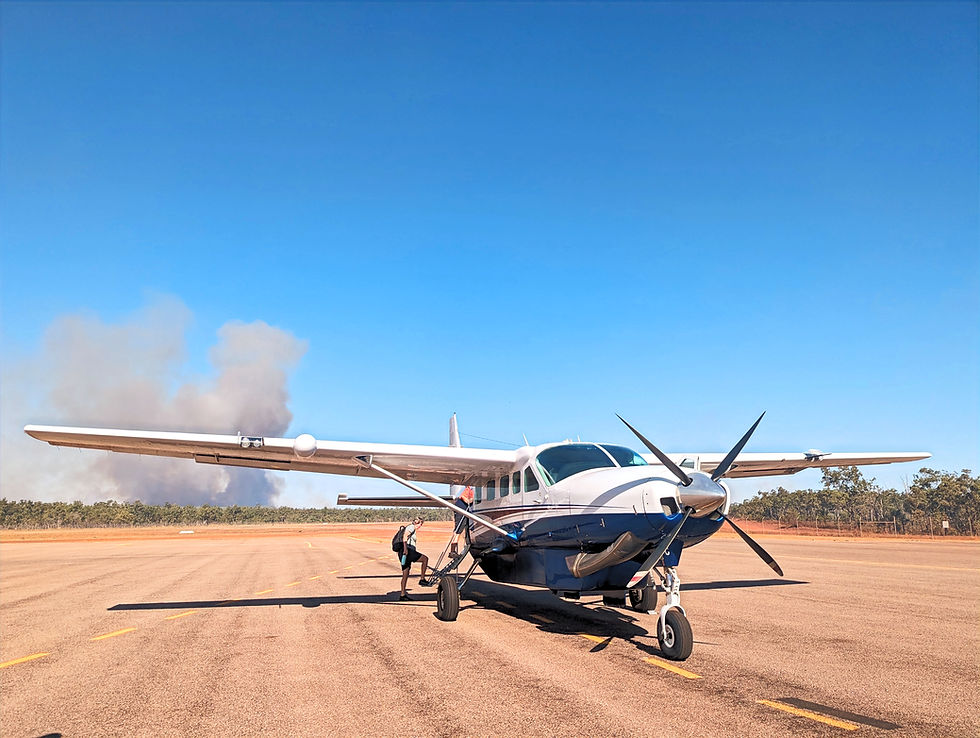From Mat to Method: Intercultural Data Analysis
- Dr Sarah Ireland

- Sep 23
- 2 min read
Larrakia Country, Northern Territory, 23 September, 2025.
On Larrakia Country, our multilingual and intercultural team of Yolŋu and non-Yolŋu researchers recently gathered for a week of deep intellectual work. We are a unique collective — drawing together the wisdom of Yolŋu knowledge systems and Western research traditions to create new ways of understanding and working.
At the heart of this is our shared commitment: to improve perinatal health outcomes in Galiwin’ku and to honour Yolŋu-led aspirations for Birthing on Country.
Our team is led by strong Yolŋu women: Professor Elaine Läwurrpa Maypilama, Rosemary Gundjarraŋbuy, Joanne Dhamarrandji and Rhoda Goluŋ Dhurrkay.

Photo credit: L-R back row Rhoda Goluŋ Dhurrkay, Jess Davis, Rosemary Gundjaraŋbuy, Emily Armstrong, Sarah Khaw. Front row Joanne Dhamarrandji, Sarah Ireland & Elaine Ḻawurrpa Maypilama.
Weaving the Mat of Knowledges
Professor Elaine Ḻäwurrpa Maypilama often reminds us of the pandanus mat — its strands carefully gathered, dyed, and woven together. For us, the mat is more than metaphor; it grounds our work in intercultural practice. Each strand, each hand, contributes to the pattern that is chosen and woven by Yolŋu. Together, we covered a series of pioneering data analysis workshops, advancing new knowledge in perinatal care, governance, and service design.
Photo credit: Sarah Ireland. Team data analysis workshops on Larrakia Country, Darwin.
Our workshop focus included:
Project Methodology — Led by Professor Maypilama and myself, exploring intercultural authority and the mat as our guiding metaphor.
Data Lifecycle & Number Story for Governance — Jess Davis, PhD student and midwife, charting Yolŋu governance of the Djȧkamirr project through number stories
On-Country Sexual Assault Care — Theresa Clasquin, PhD student, midwife and nurse, exploring systems, workforce, and Yolŋu knowledges.
Clinical Service Capabilities — Midwifery Industry expert Bettina Chaseling, investigating comprehensive women’s health care including birthing in very remote settings.
Risk & Decision-Making — Dr Emily Armstrong, speech pathologist and communication expert, examining intercultural communication about risk in clinical contexts.
Djȧkamirr Service Evaluation — Dr Sarah Khaw, midwife and doula researcher, leading reflections on Yolŋu-First Nations doula care
These sessions were not only about coding transcripts and analysing variables; they were about listening deeply to the interwoven voices, stories, and aspirations of Yolŋu women and families.
Beyond the Workshop
Extended time in Darwin also offered our Yolŋu colleagues space for practical needs often difficult to access in Galiwin’ku — from updating identification and banking documents, to visiting a podiatrist, grabbing takeaway, and reconnecting with family. And yes, there was even time for some colorful skirt shopping!

Meanwhile, Professor Maypilama carved out quiet hours to continue work on our second documentary.
Like the mat, this film is being patiently woven — already well-gestated, and soon to be birthed. More on this exciting development soon.
Learn more with these links
Colleagues
Stream the first documentary DJÄKAMIRR















Comments